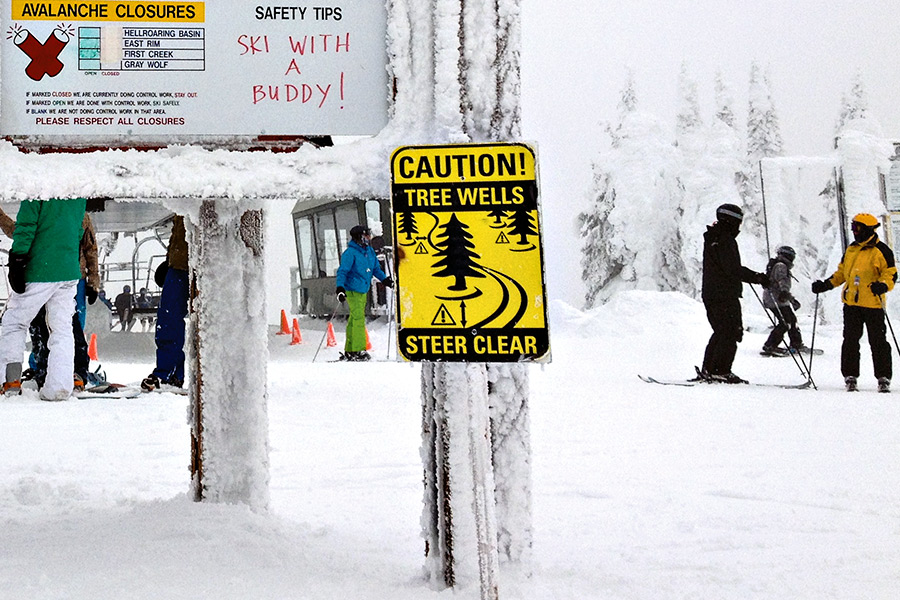A 56-year-old Canadian skier died March 2 at Whitefish Mountain Resort after falling into a tree well on an un-groomed but inbounds expert run called First Creek.
In a press release, Flathead County Sheriff Chuck Curry said the man was skiing with a friend when the pair became separated. The friend reported his missing partner to ski patrol and, after a two-hour search, the man’s body was located in a tree well at approximately 3:15 p.m.
The victim’s name is Charles Douglas Herr of Calgary, Alberta.
The most recent death marks the second confirmed fatality on Big Mountain this winter following a New Year’s eve incident that claimed the life of a snowboarder, who also fell into a tree well and suffocated.
Signs posted around the mountain warn skiers and snowboarders of the hazards of tree wells, which are characterized as deep, bough-covered pits that can gather loose, unconsolidated snow capable of burying and trapping a fallen skier.
A statement from Whitefish Mountain Resort expressed condolences to the victim’s family and urged skiers and snowboarders to exercise caution.
“Any death at our resort is a tragedy and felt deeply by the entire Whitefish Mountain Resort community. We extend our deepest condolences to the family and friends as they cope during this difficult time,” according to the statement.
“This accident is another unfortunate reminder that tree wells are an inherent risk of the sport,” the statement continues. “We encourage our guests to take extra caution when skiing in the trees and deep snow. Ski with a partner and keep them in sight. Call ski patrol immediately if someone is missing. Be as precise as you can in describing the trail name and location as well as the description of the missing person. We will continue to help our guests understand the risks and encourage educating themselves on this subject. An excellent resource for learning more about tree wells and deep snow safety is the website deepsnowsafety.org, which can be linked to from the Tree Well & Deep Snow Safety page of our website.”
Also on March 2, was a stunning double-tragedy struck at Mount Bachelor in Bend, Oregon, where a skier and a snowboarder died in separate incidents after falling into tree wells in different areas of the resort. The same day, a 36-year-old man died while snowboarding at China Peak Mountain Resort in California. He fell head first into 5 feet of snow and suffocated, according to news reports.
And at Squaw Valley in California on March 2, five guests were caught in an inbounds avalanche, which badly injured one person.
Meanwhile in Whitefish, search crews continue to look for Dr. Jon Torgerson, the 62-year-old physician from Columbia Falls who went missing Feb. 17 in the Big Mountain backcountry.
He still has not been found despite exhaustive efforts.
Curry said search efforts are focused on the out-of-bounds area off of Flower Point, a popular backcountry skiing area where Torgerson is believed to have gone skiing alone. Volunteer search and rescue personnel from North Valley Search and Rescue and the community are combing the sprawling search zone on snowmobiles, snowshoes and skis, Curry said. The ground search involves probing deep tree wells.
Underscoring the inherent hazards of skiing was a separate incident March 2 involving a 30-year-old Canadian snowboarder reported missing by friends who had last seen him inbounds in the Chair 2 area at approximately 6:30 p.m. A search by Flathead County Search and Rescue and the Flathead Nordic Ski Patrol located him out of bounds shortly before midnight below the ski resort, between Northern Lights Drive and Whitefish Lake. He had become lost in the dark and wound up below the lift, Curry said.
The man was rescued by the Two Bear Air Rescue helicopter and ferried back to the resort.
“We wish to thank all the dedicated volunteers who have been working countless hours over the last two weeks in multiple search and rescue cases,” Curry stated in the release.
